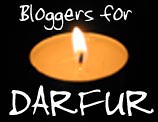U.S. Diplomat and Sudanese Driver Killed in Khartoum
On January 1, 2008, a USAID diplomat and his Sudanese driver were shot and killed in Khartoum, happening just one day after peacekeeping duties were transferred to UNAMID, a hybrid UN/African Union force. Details here.
Labels: Darfur, peacekeeping, Sudan


2 Comments:
Read, re-print or link to this original report on Darfur,
"A Hunger For Home: Stranded in the Desert, Darfur's Refugees Live with an Endless War,"
This original report for The Indypendent, and touching on-the-ground report on the Darfur by award-winning journalist, Nicholas Powers, of the Indypendent! The piece is a first person account of time spent in Darfur, with vivid portraits of the people that are suffering the most from this conflict that you won't find in mainstream media.
Photos and Text By Nicholas Powers
From the edge of her village in eastern Darfur, she
saw helicopters over the huts, turning and shooting at
the people below. Fatime ran over hills, across dry
river beds, around bush. She ran with family away from
the fading gunfire.
The sun rose and fell, spinning their shadows like a
needle on a broken compass. They walked on swollen
feet, breathed though dry throats, watched the
horizon. Someone shouted. Men on horses trotted into
the open, pulled the reins and galloped toward Fatime.
Lost in Translation
I learned about Darfur in 2006. On TV, sorrow-creased
faces begged for help. It reminded me of flooded New
Orleans, families on roofs reaching up for rescue. It
took a day to buy a ticket to New Orleans and be
there, giving out food and picking up stories. It took
almost two years to stomp the water and screams out of
my mind.
I taped a map of North Africa over my bed and studied
Darfur. The war appeared in the media in 2004 but it
had begun in the 1890s when the English drew borders
that boxed the Arab north and African south inside the
same nation now known as Sudan. The English developed
the north but left the south a desert. After Sudan
gained its independence in 1956, the Arabs saw
themselves a degree better than the Africans, and
since then both have fought over the identity of the
nation. In between the rounds of war, old rituals
continued. Each season, Arab herders drove cattle to
the southern region of Darfur, where Fur, Masaaleit
and Zaghawa tribes welcomed them. The cattle
fertilized soil and helped carry supplies. In 2003, a
drought in the North dried wells, turning earth to
sand and forcing Arab herders south. They wanted more
than grazing for cattle; they wanted new land.
Rifles were handed out to African tribesmen. Anger
crystallized into rebel groups, among them the
Sudanese Liberation Army and the Justice and Equality
Movement. After the rebels raided a military outpost,
the Arabdominated government, flush with oil money,
bought weapons for the Arab herders creating a militia
we now know as the Janjaweed. They galloped into
villages; shooting men down, ripping women apart,
stuffing bodies into wells or ravines. Refugees fled
to the neighboring nations of Chad and the Central
African Republic. In the years that followed, 2.5
million people were driven from their homes and up to
255,000 were killed.
For more, check out
http://www.indypendent.org/2008/01/12/a-hunger-for-home-stranded-in-the-desert-darfur's-refugees-live/
The piece, "013 ~ New Year, New Adventure" [http://globalpulisya.blogspot.com/2008_01_01_archive.html] , might be of interest to your cause.
Post a Comment
<< Home